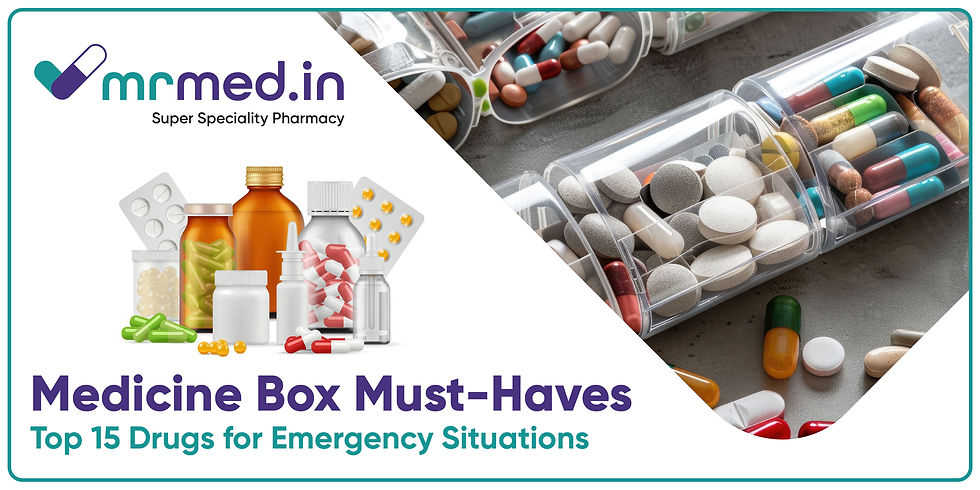Medicine Box Must-Haves: Top 15 Drugs for Emergency Situations
- Healthcare Tips

- Aug 14, 2024
- 4 min read

Health problems can occur unexpectedly at any moment, and having a well-prepared medicine box can make all the difference. From minor injuries to sudden illnesses, keeping the right medications on hand ensures you’re ready to handle emergencies effectively. Here’s a guide to the top 15 essential drugs that should be part of your household emergency kit.
What Should I Include in My Emergency Medicine Kit?
An effective emergency medicine kit is essential for managing urgent health situations. Here are the top 15 medications that should be included in your kit:
Paracetamol: Paracetamol is a key medication for relieving pain and lowering fever. It’s effective for a range of issues, including headaches, muscle pain, and fever, making it a vital part of any emergency kit.
Ibuprofen: As a non-steroidal anti-inflammatory drug (NSAID), Ibuprofen helps reduce pain, fever, and inflammation. It’s particularly useful for conditions such as arthritis and back pain, offering relief from various types of discomfort.
Antihistamines: Antihistamines are crucial for allergy sufferers. They alleviate symptoms like sneezing, itching, and a runny nose, providing quick relief from allergic reactions.
Aspirin: Aspirin is known for its pain-relieving and anti-inflammatory properties. It can also play a role in preventing heart attacks under certain conditions, making it a versatile medication for your emergency kit.
Antibiotics (As Prescribed): While antibiotics should be used only as directed by a healthcare professional, having a small supply of commonly prescribed antibiotics can be beneficial for managing infections. Ensure they are used responsibly.
Anti-Nausea Medication: Anti-nausea medications are useful for managing symptoms like motion sickness or gastrointestinal distress. They help prevent dehydration by controlling nausea and vomiting.
Anti-Diarrheal Medicine: Anti-diarrheal medications are essential for managing diarrhoea, which can occur due to various reasons, such as foodborne illnesses. They help decrease the frequency of bowel movements and prevent dehydration.
Cough Syrup: Cough syrup can provide relief from persistent coughing by soothing the throat and reducing the urge to cough. It’s particularly useful for managing symptoms of colds or respiratory infections.
First Aid Cream: A good first aid cream is crucial for minor cuts, scrapes, and burns. It helps heal wounds and prevent infections. Look for creams that contain antibiotics for additional protection.
Hydrocortisone Cream: Hydrocortisone cream is effective for treating skin rashes, insect bites, and other irritations. It helps reduce inflammation and itching, offering quick relief for various skin issues.
Inhaler: For individuals with breathing issues, including a Sosrane Inhaler in your emergency kit can be crucial for managing respiratory conditions and improving airflow.
Cold and Flu Medications: These medications address symptoms such as congestion, sore throat, and fever associated with colds and flu. Keeping these on hand can help manage and alleviate symptoms during illness.
Electrolyte Powder: Electrolyte powder is useful for rehydrating after episodes of vomiting or diarrhoea. It helps replenish lost fluids and electrolytes, supporting overall hydration and recovery.
Pain Relief Gel: For localised pain, such as muscle or joint pain, a pain relief gel offers targeted relief. It’s easy to apply and works directly at the site of discomfort.
Burn Ointment: Minor burns are common household injuries. Burn ointment helps soothe the pain and promote healing, making it an important addition to your emergency kit.
How Can I Store My Emergency Medicine Properly?
To keep your emergency medications effective, keep them in a cool and dry place, protected from direct heat and sunlight. Avoid placing them in high-humidity areas like bathrooms. Keep each medication in its original, tightly sealed container to protect against moisture and light. If a medication needs refrigeration, place it in the refrigerator but not in the door, where temperatures can fluctuate. Consistently verify expiration dates and properly dispose of any items that have expired. Organise your medicines with clear labels for easy identification and ensure the storage area is secure from children and pets. Proper storage helps maintain medication effectiveness and readiness for emergencies.
How Often Should I Replenish My Medicine Box?
Review the contents of your medicine box regularly to ensure that all items are in good condition and have not expired. Replace any used or outdated medications promptly to keep your kit ready for emergencies.
Where Can I Buy These Medications?
Most of these medications are available at local pharmacies. For added convenience, you can also buy online medicine from reputable e-pharmacies, ensuring you receive high-quality products delivered to your home.
Why Is It Important to Have an Emergency Medicine Kit?
An emergency medicine kit is crucial for managing unexpected health issues efficiently. It enables you to address minor ailments and provide immediate relief during urgent situations until professional medical help is available. A well-stocked kit ensures that you are prepared for a range of scenarios, enhancing your ability to handle emergencies effectively.
Parting Words
Keeping a well-stocked medicine box is essential for any household, providing peace of mind and readiness in case of emergencies. By including these top 15 must-have drugs in your kit, you ensure that you’re equipped to handle various health issues quickly and effectively. Regularly check and replenish your medicine box to keep it in optimal condition. Being prepared can significantly impact managing health emergencies confidently. Stay safe and stay prepared!
Comments